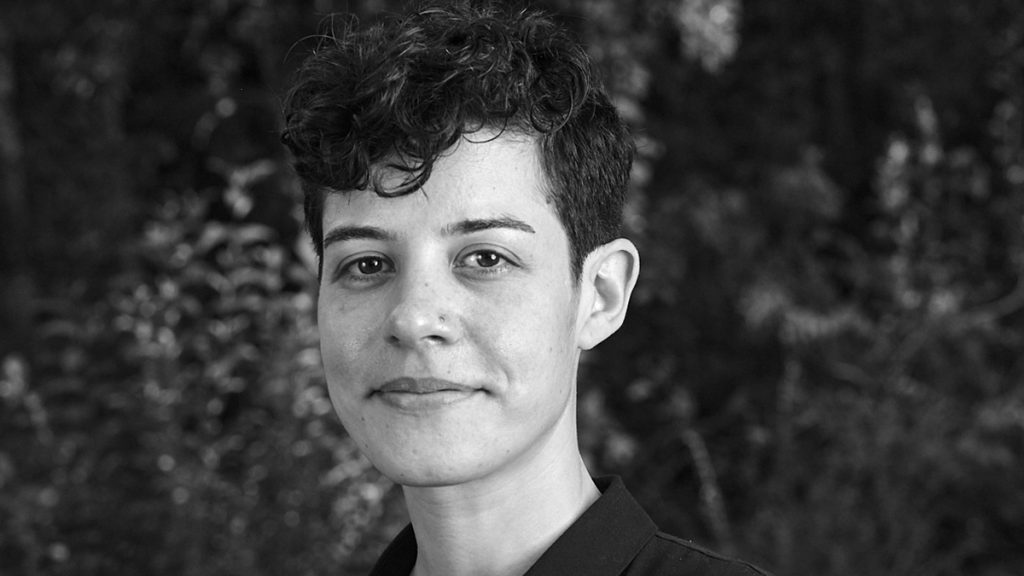
Photo: Courtesy of Alli Finn
How to make change through research
Q&A with Alli Finn, Senior Partnerships and Strategy Lead at the AI Now Institute
At its core, journalism is about transferring high quality information to help people make better decisions. There are many other professionals who do this kind of work, but in different fields. For our RJI Fellowship, we are reaching out to people who work towards change through direct action and education to learn about their work and integrate it into the resource we are building.
One person we spoke to is Alli Finn, Senior Partnerships and Strategy Lead at the AI Now Institute, where they collaborate with and support communities and organizations who are facing harm from AI systems and push for alternatives. Previously, they spent more than a decade fighting for immigrant and worker rights — from frontline casework, to deportation defense, to local and national campaign strategy.
Below is an interview we did with them, edited for length and clarity.
Vo: What do you do?
Finn: I am an organizer and a movement researcher focused on fighting back against extractive and carceral technologies, particularly AI and the data economy as well as state and corporate surveillance tech.
A lot of my work now is with the AI Now Institute, which challenges the trajectory of the AI industry and the concentration of power. My role is to support groups and communities on the ground facing direct harm not only from AI systems and the application of AI tools on every aspect of people’s lives, but also from the infrastructure that we’re told is needed to develop AI systems, mainly data centers and the power infrastructure around it.
Vo: What role do research and education around a particular topic play in your work?
Finn: To me, the whole point of research is not the academic pursuit of the creation of knowledge, but to demystify what are often intentionally opaque systems and structures about how our society is set up to work. And so, I conduct research for the purposes of demystification, which I think is essential to popular and political education.
In technology specifically, there’s often this pressure to leave it to the experts and a general feeling that regular people can’t understand it, which is absolutely not true.
I think that effective research helps tease out not necessarily the technicalities of how technology works, but the power structures behind it, who it’s deployed on, whose power it increases or decreases.
So to me, research shouldn’t stop at research alone. It needs to continue into education for the purposes of finding points of intervention and change.
For me, the question is always, like, “Where is the power, where are the levers, where is the pressure point, not just for those making or deploying the technology, but the entire ecosystem?”
So I think about research as translation.
Vo: How do you build a theory of change for your work?
Finn: I think first, it’s important to remember that theories of change are constantly iterative processes. That doesn’t mean that we need to spend a year to do it and stop your work while you do it, but it should be responsive to the world around you and the needs of the communities that you’re a part of or the constituencies that you’re accountable to. I think that applies to journalism, to organizing, and to advocacy.
And for me, it’s also very collective work. I don’t think I would do a good job if I sat on my computer by myself and wrote a theory of change for myself, my organization, [and] my organizing work because this work is inherently collective.
I’ve benefited a lot from doing it with a core trusted group of folks and having conversations with people whose lives are shaped by the issues that you’re collectively working on.
I always start building a theory of change, by trying to understand the problem itself, not starting from what my intervention is, or what I’m set up to do, but to start from the problem and doing a bit of a power mapping around it: [who] was impacted? Where does the problem come from? I like to get kind of a high level picture. And then from that [I] identify where possible interventions are.
I also find it helpful to think ahead into the future, where does this go? What is the world that we’re collectively working towards?
Vo: What are the most important forms of change, i.e. narrative change, electoral change, behavioral change, etc.?
Finn: I find this to be a challenging question because oftentimes, these many types of change are networked together, right? Sometimes we deeply need a narrative shift at the national level or the media level or in a particular region or field in order to provide support for specific policy change at the local level.
For example, think about how the national conversation has not just shifted, but come to be, expanded and then shifted about data centers. We’re in a different place than we were a year ago, and I think that that’s giving support to local organizers on the ground who are raising questions about these physical facilities and the massive resource extraction.
So I think, it’s not that one [form of change] is necessarily better than the other, but they inform each other, and I think that they can also be used to hold each other accountable.
For me, what’s most important regardless of what type of change you’re pursuing — whether it’s narrative, whether it’s electoral, whether it’s looking at influencing the behavior of individuals or institutions is that is accountable to communities that are most impacted — [is that it] increases the power, visibility, that [impacted] communities have.
How I think about it is “who is my work elevating? What is my work promoting? Whose power doesn’t increase at the end of the day?”
Vo: What role does media play in your work?
Finn: I feel very grateful for incredibly strong journalism over the past number of years, uncovering how technologies were the forces behind the concentration of power, and I think at its best that this type of journalism performs an incredibly needed investigative role, often where community organizers and community members don’t have the capacity.
So the investigative role of journalism and the translation role, like I mentioned before, can and often does play a deeply significant role in exposing how these webs work. And also at its best, [it’s] amplifying the work and the struggles and the impacts that go on the ground.
Vo: What are ways in which you measure success?
Finn: I think having worked and organized for a long time in worker rights spaces, immigration justice spaces, and with movements, I know that it is very easy to feel like we are not succeeding when we’re up against forces that are so big and all consuming.
But success is not only policy change, right? It’s not only electoral. I often think about it as community building, like I said before, [and about] shifting who has power.
You can run a very successful campaign that doesn’t result in a win but that moves the needle of what’s possible, right? It expands the overton window.
So I think a lot of this work is really long-term, and I imagine for journalism, it’s the same: success is not short, quick hits but it’s deep, long-term work that opens space for that long term change and also maintains and strengthens movements so that when we do have moments of possibility, we’re ready for them.
I think at this moment, when I think about AI and technology. You could look at this moment and say, “We have no federal policy opportunities. Things are very difficult.” And I think there’s also some huge opportunities and ongoing success in this moment of mobilizing local communities and statewide initiatives. People are experiencing and seeing firsthand how these tech field systems impact them, and I think we have a lot of opportunity.
Even if the policies we pass aren’t perfect, they do push back against the inevitability, the perceived inevitability [of AI], because it’s not inevitable.
We would love to hear from your efforts to experiment with journalism-based change-making. Feel free to fill out this survey to stay in touch or to book some time with Nicole.
Cite this article
Vo, Lam Thuy; and Lewis, Nichole (2025, Oct. 7). How to make change through research. Reynolds Journalism Institute. Retrieved from: https://rjionline.org/news/how-to-make-change-through-research/

